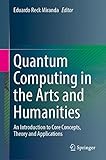Quantum Computing in the Arts and Humanities [electronic resource] : An Introduction to Core Concepts, Theory and Applications /
Material type: TextPublisher: Cham : Springer International Publishing : Imprint: Springer, 2022Edition: 1st ed. 2022Description: IX, 367 p. 158 illus., 63 illus. in color. online resourceContent type:
TextPublisher: Cham : Springer International Publishing : Imprint: Springer, 2022Edition: 1st ed. 2022Description: IX, 367 p. 158 illus., 63 illus. in color. online resourceContent type: - text
- computer
- online resource
- 9783030955380
- 005.3 23
- QA76.76.A65
From digital humanities to quantum humanities: Potentials and applications -- Quantum computing and cognitive simulation -- The philosophy of quantum computing -- Quantum-like cognition and rationality: Biological and artificial intelligence systems -- Quantum music, quantum arts and their perception -- Quanta in sound, the sound of quanta: A voice-informed quantum theoretical perspective on sound -- Quantum cinema and quantum computing -- How to make qubits speak -- A quantum computing approach to harnessing the logic of the mind for brain-computer interfacing -- The history of games for (quantum) computers.
Quantum computing (QC) is surfacing as a promising disruptive technology in the field of computer science. Built on the principles of quantum mechanics, QC can run algorithms that are not trivial to run on digital computers. Unprecedented new uses for this technology are bound to emerge from ongoing research. The development of conventional digital computing technology for the arts and humanities has been progressing in tandem with the evolution of computers since the 1950s. Today, computers are absolutely essential for the arts and humanities. Therefore, future developments in QC are most likely to impact on how research in the humanities will be conducted and the way in which artists will create and perform. This integrating book delivers a diverse collection of chapters by pioneers of emerging interdisciplinary research at the crossroads of quantum computing, and the arts and humanities. Topics & features: Presents the first work dedicated tothe topic of QC in the arts and humanities Offers accessible coverage for audiences without a strong background in quantum physics and mathematics, including humanities researchers and those involved in entertainment and the creative arts Covers topics at the crossroads of QC, from philosophy and social sciences to games and music Provides insights from leading scholars in the arts and humanities who are pioneering the use of QC in their fields This unique book assembles contributions by scholars championing research in a wide array of areas, informed by quantum computing. Researchers and readers will benefit from thought-provoking discussions in numerous areas, including cognition, perception, language, music, games, visualization of the sub-atomic world, and brain-machine communication. Prof. Eduardo Reck Miranda is a composer and a professor in Computer Music at Plymouth University, UK, where he is a director of the Interdisciplinary Centre for Computer Music Research (ICCMR). His previous publications include the Springer titles Handbook of Artificial Intelligence for Music, Guide to Unconventional Computing for Music, Guide to Brain-Computer Music Interfacing and Guide to Computing for Expressive Music Performance.


There are no comments on this title.